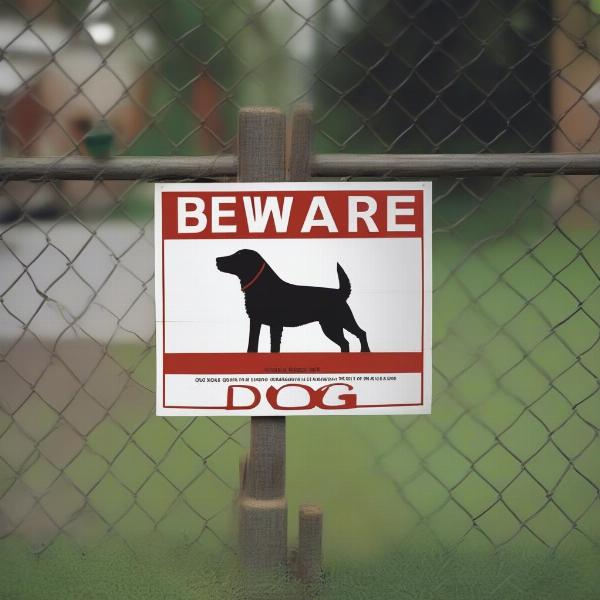Virginia dog bite laws are complex and understanding them is crucial for both dog owners and bite victims. This article will provide a comprehensive overview of these laws, covering everything from liability to prevention, to help you navigate this challenging area. Whether you’re a dog owner seeking to understand your legal obligations or a victim seeking recourse after a bite incident, this guide will equip you with the essential knowledge.
Decoding Virginia’s “One-Bite” Rule and Negligence
Virginia operates under a modified “one-bite” rule. This doesn’t mean a dog gets a free pass for its first bite. Instead, it means the owner might be liable if they knew or should have known about their dog’s aggressive tendencies. This knowledge can be established if the dog has previously displayed aggression, even if it hasn’t resulted in a bite. Negligence also plays a key role. If an owner fails to take reasonable precautions to prevent a bite, such as properly leashing their dog in public, they could be held liable, even without prior knowledge of aggressive behavior.
Liability in Dog Bite Cases: Who Pays?
Liability in dog bite cases in Virginia often falls on the dog owner. However, the specifics can vary. For instance, if a dog bites someone while being provoked, the owner might have a defense. Similarly, if the victim was trespassing on the owner’s property, the owner’s liability could be reduced. It’s also important to note that landlords could be held responsible if they knew about a tenant’s dangerous dog and failed to take action.
Understanding the “Dangerous Dog” Classification
Virginia law defines a “dangerous dog” based on specific actions, such as inflicting serious injury or killing a companion animal without provocation. Owners of dogs classified as “dangerous” have stricter responsibilities, including registration, confinement requirements, and increased liability.
 Dangerous Dog Sign in Virginia
Dangerous Dog Sign in Virginia
What to Do After a Dog Bite: Seeking Medical Attention and Legal Counsel
If you’ve been bitten by a dog in Virginia, seek medical attention immediately, even if the bite seems minor. Document the incident thoroughly, including photos of the injury and the dog, if possible. Obtain the owner’s information and report the bite to the local animal control. Crucially, consult with a personal injury attorney who specializes in dog bite cases. They can advise you on your legal options and help you navigate the complexities of Virginia’s dog bite laws.
Gathering Evidence and Building Your Case
Building a strong dog bite case requires meticulous documentation. Collect any evidence related to the incident, including medical records, witness statements, and communication with the dog owner. Your attorney can help you gather and preserve this crucial evidence to support your claim.
Preventing Dog Bites: A Shared Responsibility
Preventing dog bites is a shared responsibility. Dog owners should socialize their dogs properly, provide adequate training, and ensure their dogs are always leashed in public. Avoid approaching unfamiliar dogs, especially if they are eating, sleeping, or with their puppies. Teach children how to interact safely with dogs and never leave a child unsupervised with a dog.
Conclusion: Navigating Virginia Dog Bite Laws with Confidence
Understanding Virginia’s dog bite laws is essential for both dog owners and the public. By being aware of your rights and responsibilities, you can help prevent dog bites and protect yourself and your community. Remember, seeking legal counsel after a dog bite is vital to ensure you receive the appropriate medical care and legal recourse.
FAQs: Common Questions about Virginia Dog Bite Laws
- Does Virginia have a “strict liability” law for dog bites? No, Virginia’s dog bite law is based on negligence and the “one-bite” rule, meaning the owner’s knowledge of the dog’s aggressive tendencies is a factor.
- What constitutes a “dangerous dog” in Virginia? A dog can be classified as “dangerous” if it inflicts serious injury or kills a companion animal without provocation, among other criteria.
- Can I sue a landlord for a dog bite on their property? Yes, if the landlord knew about the dog’s aggressive tendencies and failed to take action.
- What should I do immediately after a dog bite? Seek medical attention, document the incident, gather owner information, and report the bite to animal control.
- Do I need a lawyer for a dog bite case? Consulting with an attorney is strongly recommended to understand your legal options and navigate the legal process.
- How can I prevent my dog from biting? Proper socialization, training, and leashing are crucial, as is responsible dog ownership practices.
- What should I teach children about dog safety? Teach children to never approach an unfamiliar dog without permission, especially when the dog is eating, sleeping, or with puppies.
Related Articles:
About ILM Dog
ILM Dog is your trusted international resource for comprehensive dog care and breed information. We offer expert guidance on dog breeds, health, training, nutrition, grooming, and accessories. Whether you’re a seasoned dog owner or just starting your journey, ILM Dog provides practical advice and resources to help you provide the best possible care for your furry companion. For personalized assistance, reach out to our experts via email at [email protected] or call us at +44 20-3965-8624. We’re here to support you every step of the way.